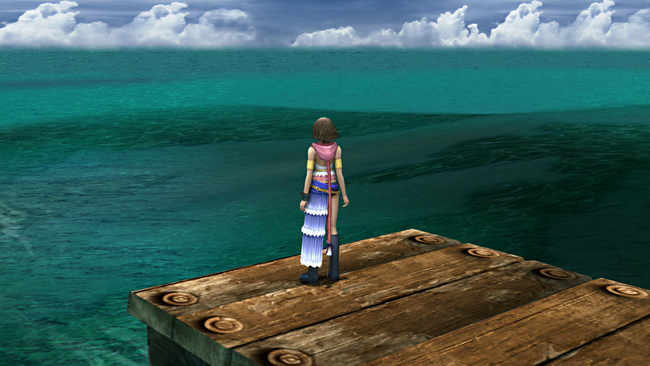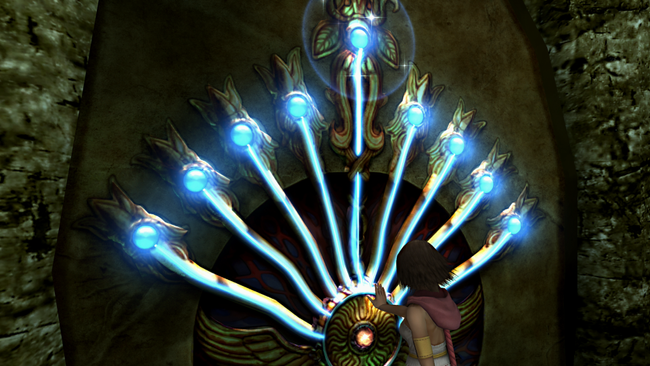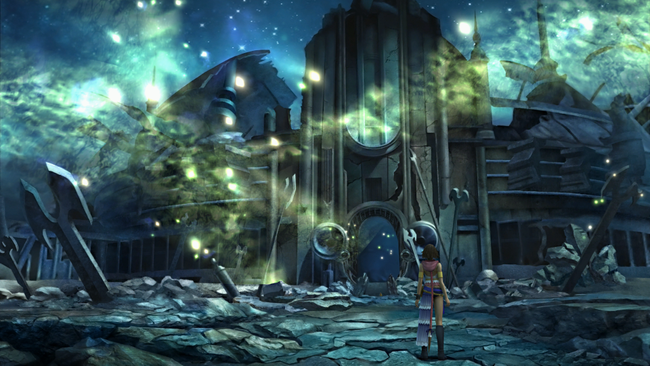
Final Fantasy X-2's Epilogue-style storytelling is bizarre and beautiful
Like many RPG classics, Final Fantasy X is about saving the world. The world of Spira is devoid of home, and sends scores of people to their deaths as sacrifices in the name of survival.
Without Summoners and their Final Aeons, the calamitous creature known as Sin will destroy the realm of Spira in its entirety. Only by throwing these capable priestly characters’ lives away is Sin temporarily satiated - or so the legend goes - and so the cycle of death spirals endlessly across a millennium.
Yuna appears destined to repeat this ghastly process, serving as just another cog in the wheel. There are echoes of Final Fantasy VII, where one pure-hearted character must die to save the world. But Final Fantasy casts aren’t so good at obeying the whims of fate - and in the end, Yuna destroys Sin and lives to tell the tale. The spiral ends - even if her lover, Tidus, must depart from Yuna’s world in a bittersweet finale.
Final Fantasy X is bittersweet. It’s also frank and profound in its musings on both the dangers of organized religion and its ability to unite people in times of great need. Above all, what strikes me is how the game teaches a particularly harsh lesson: You can’t always get what you want. Yuna walks away with her life, a hero - but loses the love of her life in the process. She’s instead left to mourn and to lead, destined to help Spira rebuild.

Final Fantasy X-2 is hugely uninterested in that sentiment, however. According to FFX-2, you can get what you want - you just need to commit to the laborious and unwieldy process of gaining a 100% completion file. Drain this game for everything it has on tap, and the girl can still get her guy. Everything can be smiles. Forget bittersweet; load up on saccharine dreams.
At least, that’s how I scornfully regarded Final Fantasy’s first ever direct sequel when it debuted two whole decades ago. Truth be told, it’s been my dominant viewpoint on the bright, poppy story for the majority of that time - that by eschewing the sobering moments of loss so prevalent in the original, its follow-up tale is little more than a chance to put Final Fantasy X’s brave protagonist in a pair of ill-fitting hot pants. Yuna is a completely different character here, Spira is weirdly unrecognizable, and all that governmental strife between the radical Youth League and more conservative New Yevon is just lip service.
I decided to give FFX-2 another shake a few years ago, at which point things finally crystallized. I began to perceive it in all the ways I suspect its creators had hoped I would - not as a botched attempt at an epic sequel, but as one of media’s most in-depth epilogue chapters.
To be sure, FFX-2 tells its own story, from start to finish, and that story includes finding ways to fill that aforementioned governmental void whilst stopping a scorned man from activating an ancient weapon. But above all that, and far more to the point, it’s really just a string of related misadventures between friends as they explore a Spira that’s been freed from its millennium of oppression. And every misadventure feels like part of this vast denouement in service to the prior game. Catching up with FFX’s characters as they each take that monumental first step forward in a strange new world - I dig that.

All those quirky moments in X-2 sure add up; remove every cheesy scene from the script, and you’re not left with much else. But the quirkiness of the world and its inhabitants is the beating heart of Final Fantasy X-2, because here is a civilization that can at last rebuild, but has very little awareness as to how to do so. It is a society collectively coming to terms with the notion that what they do from here has lasting meaning, because a giant whale thing isn’t going to annihilate them ever again.
Final Fantasy X-2 is a constant trip through a rapidly-changing Spira as the former sacrificial Summoner, Lady Yuna, bears witness to what humanity can do when the healing begins, when the time comes not just to exist, but to well and truly live. Yuna herself is searching for what that means in personal terms; how do you live? Existing means breathing in, breathing out. Eating and drinking enough. Sleeping, sometimes.
But to live is to find oneself, and while it’s fair to wonder whether becoming a vagabond pop star strains believability, it’s important to note that Yuna is rather awkward for much of X-2’s runtime. She’s forcing herself to push well past former boundaries in this, well, magical girl transformation into idol culture, until toward the end of the story when a poignant speech showcases a woman who has essentially fused her former, bittersweet FFX self with her newfound, uh, Charlie’s Angels form. In that moment, Yuna feels whole, her character arc fulfilled.
Honestly, I don’t much care for the Youth League and New Yevon plot. It’s not a bad concept, and in fact, it makes perfect sense that a power struggle would arise following the events of FFX. I just don’t find its characters particularly compelling. I feel the same about Shuyin and the Vegnagun, except I’m not sure I even find the concept particularly compelling. And the less said on LeBlanc, or - shudder - Brother, the better.

Yet I can appreciate FFX-2 now far more than I did. Whereas I once stood by its excellent battle system and little else, I now find even these big story threads far more fulfilling, through the lens of belief that every flight Yuna and her Gullwing pals take across Spira spreads hope through a ruined world. To watch as its denizens embrace the unknown future - and get pretty funky in the process - it hits the right notes now.
The mini-games galore, the corny character interactions, in a weird way it’s like all of Spira just hit adolescence after escaping a perpetual painful childhood. It’s OK that everyone’s let their proverbial hair down in the process, even if I still cringe at the hot springs hijinks and similar fare.
In a way, then, FFX-2 is more bold, more ambitious, than its legendary predecessor. It’s not about the war, but the duration. It’s not about the planet-saving (OK, so there’s some of that too) but the continuing defense of hard-earned survival. It’s about finding the liberty to become your true self after a lifetime where the decisions are more or less made for you, typically beginning and ending with ‘well, what are the odds Sin kills you this week?’ It’s beautiful, bizarre, epilogue-style storytelling that examines something I wish more epic fiction did - it answers that simplest and most elusive of questions: ‘what happens next?’
Don’t let me get too carried away, though. That 100% completion mechanic? It still sucks.